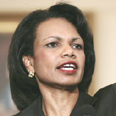
US prepared for direct talks with Iran
US Secretary of State Rice says Washington willing to join other nations in negotiations with Tehran if Islamic republic agrees to stop nuclear development; Iran spokesman says in response declaration 'makes no sense,' as Tehran has already made know its refusal to halt civilian nuclear program
In a major policy shift, the United States said Wednesday it is prepared to join other nations in holding direct talks with Iran on its nuclear program if Iran first agrees to stop disputed nuclear activities that the West fears could lead to a bomb.
"To underscore our commitment to a diplomatic solution and to enhance prospects for success, as soon as Iran fully and verifiably suspends its enrichment and reprocessing activities, the United States will come to the table," Secretary of State Condoleezza Rice said at the State Department.
Rice has phoned Foreign Minister Tzipi Livni and updated her before making her statement on Iran.
Political sources in Jerusalem said that Israel supports the United State's stance as expressed in Rice's remarks.
Spokesman for Iran's Foreign Policy and National Security Committee Kazem Jalali said in a first response to the US statement that "the prerequisite posed by the United States makes no sense, since Iran has declared in the past it is unwilling to suspend its civil nuclear program." He added that Tehran questions the truthfulness of the American statement, saying that the US needs to prove itself to the Iranians.
The Swiss ambassador to the United States was called to the State Department earlier Wednesday to receive a copy of Rice's remarks for transmission to Iran, US officials said.
Suspending uranium enrichment and related activities in order to talk with the United States would not preclude Iran from later insisting that it be allowed to continue those activities. At that point, the United States and its allies would be expected to move for tough UN Security Council action, possibly including economic or other sanctions.
Bush seeks diplomatic solution
Meanwhile, President George W. Bush told reporters at the White House Wednesday: "I believe it is very important that we solve this issue diplomatically and my decision today is that the United States is going to take a leadership position in solving this issue."
The US president added, however, that Washington will hold fast to its insistence that Iran abandon its alleged efforts to create a nuclear weapon.
"Our message to the Iranians is that one, you won't have a weapon. And two, that you must verifiably suspend any programs at which point we will come to the negotiating table to work on a way forward," the president said.
"You're seeing robust diplomacy," Bush added.
The US leader added that he has conferred on the issue in recent days with the heads of several key nations, including France, Britain, Russia and Japan.
"I'm on the phone a lot talking to our folks that share the same concern I share, and saying, 'look, let's get this solved diplomatically'," said Bush.
"But there must be a united international front."
Incentives and threats
Rice will meet with foreign ministers from the other permanent Security Council members on Thursday in Vienna to finalize a package of incentives and threats to be presented to Tehran.
"We hope that in the coming days the Iranian government will thoroughly consider this proposal," Rice said. European diplomats told The Associated Press that the package and the US Announcement of a willingness to talk were conditioned on pledges from Russia and China to eventually support tough actions such as sanctions if Iran continued to defy a UN call to stop its disputed activities.
White House spokesman Tony Snow said the United States will not enter one-on-one talks with Iran. The European talks included Britain, France and Germany. "There are going to be some changes, but the overall position, which is that Iran needs to take the first step, it needs to suspend enrichment and reprocessing activities, that's still there," Snow said. "That's still the foundation stone for US Diplomatic policy on this."
News of the latest US Position comes on the eve of a six-nation meeting focusing on ending months of disagreement between Washington and the Kremlin on how to persuade Tehran to stop uranium enrichment. A round of telephone diplomacy Tuesday between President George W. Bush and the leaders of Russia, France and Germany also focused on the nuclear standoff.
Dudi Cohen contributed to the report










